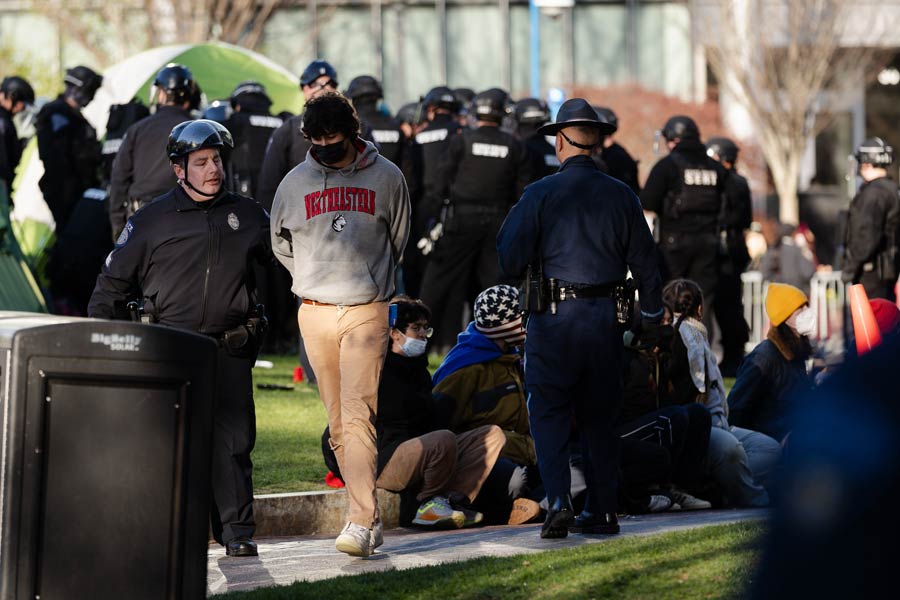Amid a dizzying array of standoffs involving pro-Palestinian demonstrations and encampments at colleges, schools that cracked down on protesters over the weekend have given varying justifications for their actions, while others sent mixed signals with their inaction.
Behind it all was a central question confronting university leaders across the country: When does a demonstration cross the line?
Colleges have cited property damage, outside provocateurs, antisemitic expressions or just failures to heed warnings as reasons to clear encampments and arrest students. Student groups have strongly denied or questioned many of those claims.
Northeastern University in Boston, Washington University in St. Louis, Indiana University Bloomington and Arizona State University had police forces move in on demonstrations Saturday, leading to more than 200 arrests. At other schools — including Columbia University, the University of Pennsylvania, Harvard University and Cornell University — an icy tension lingered Sunday as leaders warned about possible consequences for demonstrators but had yet to carry them out.
Counter protests also arose Sunday, including at the Massachusetts Institute of Technology, Penn and UCLA, where altercations broke out among demonstrators.
Washington University was calm Sunday, a day after campus police officers made 100 arrests. Administrators said that a group had violated university policy by beginning to set up a camp on the east end of campus. Police officers arrested people who refused to leave “after being asked multiple times,” the administrators wrote.
“No one has the right to disrupt the ability of people in our community to learn and work,” they said.
More than 800 people have been arrested since April 18, when the New York Police cleared an encampment at Columbia.
At Northeastern, where 102 protesters were arrested earlier Saturday, a university spokesperson said the demonstration had been “infiltrated by professional organizers” and someone had used “virulent antisemitic slurs.” Protesters denied both claims.
Many school leaders have insisted that people outside their colleges are stoking the confrontations, despite limited evidence backing their claims. In many cases, the groups of protesters have mostly involved students and university employees, but a notable exception was at Washington University on Saturday. Of the 100 arrests made, only 23 were students and four were employees, the university said in a statement Sunday.
Officials at Arizona State said that 15 students were among the 72 protesters arrested Friday, though it was unclear how many were staff or faculty.
But at other colleges, the influence of outsiders was not clear.
About 200 people attended a pro-Israel demonstration Sunday at Penn, a few hundred yards from a pro-Palestinian encampment. Noah Rubin, a junior who spoke at the pro-Israel rally, said that not all of the pro-Palestinian protesters are Penn students.
“We have a couple of people documented who have a history of violence in Philadelphia,” he said, though he did not provide more details. A spokesperson for the encampment did not respond to a request for comment on Rubin’s allegation.
Some schools have tried to curb the influence of outsiders. For instance, Harvard has sought to restrict access only to those who showed a university ID. At Northeastern, officials had asked protesters for their student IDs earlier in the week before the arrests on campus Saturday. Some protesters showed them, while others declined. At Columbia, which closed its gates, protesters on the other side added to a sense of chaos, with many shouting antisemitic chants and threatening students.
Protesters erected an encampment at the University of Mary Washington in Fredricksburg, Virginia, on Friday, but after the demonstration was opened to the public, university officials, citing safety concerns, asked organizers to take down their tents, which they did early that night. A peaceful protest continued into Saturday, when “outside influence” pushed for the encampment to grow again, Troy Paino, the university’s president, said in a statement Sunday.
When tents were put back up Saturday afternoon, the university said, the organizers were told to leave. Twelve protesters who stayed, nine of whom were students, were then arrested.
But while administrators at some schools have tried to point the finger at protesters from outside the community, their own students have often been the ones who were arrested. At Emory University in Atlanta, 20 of at least 28 people arrested Thursday had ties to the school, despite officials’ early insistence that no one involved in the encampment was affiliated with the university.
Emory’s president, Gregory Fenves, said in a statement Sunday that a peaceful protest Saturday had been disrupted by some people spray-painting “hateful messages” on a building’s exterior walls and vandalizing other structures.
“Emory is navigating a divide between individuals who wish to express themselves peacefully and those who seek to use our campus as a platform to promote discord,” Fenves said, adding that such incidents “must be rejected and condemned.”
The high-profile conflicts have fueled more demonstrations, including on campuses where protests had been dismantled earlier in the year.
At Stanford University, where an earlier encampment was taken down in February, protesters erected a second encampment Thursday. Administrators said in a statement Friday that it had delivered letters to about 60 students warning them that “failure to cease conduct in violation of university policy” could result in disciplinary action or even arrest.
But on at least one campus with a nearby encampment, at the University of Pittsburgh, graduation was held without issue Sunday as planned.
Afterward, protesters marched near campus. When they tried to get onto the lawn of the university’s Cathedral of Learning building, they were stopped by a line of police officers.
The New York Times News Service










